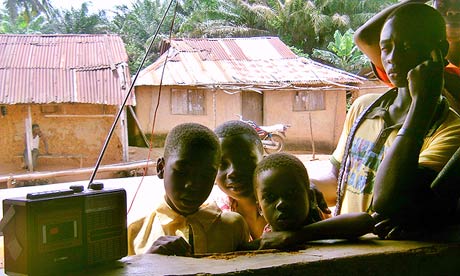by Monica Mark

For starters, put a smile on someone’s face by telling them: “you dey ginger my swagger” (literally, you spice up my swagger, meaning they have a happy/inspiring effect on you.)
In Nigeria‘s megacity of Lagos, where the country’s 500 languages come together in a chaotic medley, the rapid-fire rhythm of pidgin is the symphony of the streets. Africa‘s largest country is a sometimes fractious mix of 160 million inhabitants divided into 250 ethnicities. But street hustlers and Harvard-educated politicians alike greet each other with: “How you dey?” or “How body?”
The reply can range from a chirpy “I dey fine” to a downbeat “Body dey inside cloth,” (literally meaning “I’m still wearing clothes”). Officially known as Naija, Nigerian pidgin is spoken by tens of millions across the country. Current affairs, English and local languages are brewed together to dish up playful imagery at breakneck speed.
In Lagos, a Nigerian policeman demonstrated how his English-imported spaniel, Milly, “dey hear pidgin well well” as she obeyed a series of pidgin commands. It’s used in slogans scrawled on crumbling walls and flashy billboards. As cars swerve through sweaty streets, it can also be heard blaring on Radio Wazobia, a pidgin-only station played in crammed buses, sleek air-conditioned jeeps and roadside food stalls.
Like its variants in Sierra Leone, Ghana and Liberia, pidgin began as a form of broken English that allowed the country’s coastal inhabitants to barter slaves and later palm oil with European traders. Later, under colonialism, English became the language of prestige. “The common man wants to air their views but speaking in English they’re scared – they don’t want to do gbagam [hit something that makes a loud noise],” said Radio Wazobia morning news presenter Steve Onu, aka DJ Yaw.
“Because we use just pure pidgin, the market women, the bus drivers, the mechanics that are not educated can listen to our news and actually understand what’s happening in government.”
In a recent morning news bulletin, a parliamentary session descended into chaos when politicians “dey abuse them one by each”. “Nigeria don become mathematics [a complicated and difficult problem],” Yaw concluded. “We need to reswagger Nigeria,” agreed his co-anchor.
Three hours into the bush, at the village of Oniparagba, a dozen farmers gathered round a transistor radio. There is no electricity, but each household owns a radio. The pungent smell of palm wine mingled with their loud exclamations as they listened to a Wazobia news bulletin.
“The language of Wazobia is clear,” said rubber farmer Sunday Ayodele, alternating Yoruba, his first language, with pidgin. “Since Wazobia came, we have been enjoying, it’s become like a kind of conversation. Before, it was just blowing grammar,” he said, referring to the traditional English of politicians’ speeches.
Not everyone is a fan of pidgin’s rise. Some see its continued existence as a glaring symbol of a failed education system. So potentially powerful is pidgin’s punch that authorities periodically clamp down on it. “Fela [Kuti] said it a long time ago – the one language that can unify every Nigerian is pidgin,” said Funsho Ogundipe, who played alongside Nigeria’s most famous musician.
Kuti’s fiery songs railing against corrupt leaders who “paddy paddy” money earned him beatings and jail sentences in the 1980s. More recently, in 2004, then president Olusegun Obasanjo banned a popular rap song called Jagga jagga (Rubbish Rubbish) which took aim at politicians who “scatter scatter” (ruin) the country. There are others who are less than enthusiastic in a country where four in 10 adults are illiterate. “Broken English is OK if you are living off your wits but would you employ someone who can only speak that kind of English?” one Nigerian linguist said. Others, including academics who run the Lagos-based Naija Langueji Akademi, see the language as worthy of scholarly study, and important in bridging huge educational divides.
“Pidgin is used in some higher education classes where students are from various backgrounds, so it’s the best bet for communicating,” said linguist Godwin Iwuchukwu of Calabar University. “Maybe it doesn’t yet fulfil the criteria of being a national language but has all the major features of a language, and it doesn’t come with any of the political issues of choosing a single national language.”
Radio Wazobia’s popularity continues unabated. “Surprisingly our listenership has grown even among people you might call elite,” Yaw said. “Once they see me, the first thing they say is, ‘Yaw, how you dey man?’ They’ll speak pidgin first even if we go to correct English after that.”
Beginner’s guide to pidgin
“Wetin de happen?” (what’s happening) often marks the start of a bewildering conversation to newcomers in Nigeria, even though pidgin is based on English. But never fear – after this crash course, “you go fit yarn pidgin” (you will be able to speak pidgin).
For starters, put a smile on someone’s face by telling them: “you dey ginger my swagger” (literally, you spice up my swagger, meaning they have a happy/inspiring effect on you.)
“Chop” – which means to eat – is used in all sorts of creative ways in pidgin. Canapes at a fancy party are “small chops”, or popular Nigerian artists describe being so in love they don’t mind that keeping a lady will “chop my money”. However you use it, remember,”lazy man no dey chop for Lagos” (you have to be able to hustle to get by in Lagos).
A particular favourite is “shine your eye” which means be streetsmart/aware/keep your eyes open.
Alternatively, if learning all this is too much for you, shrug and say “you dey scatter my brain”.
—————————————
“Paddy paddy”, which means “friend friend” in pidgin. Fela Kuti used the phrase to describe the cronyism of Olusegun Obasanjo’s military dictatorship between 1976 and 1979.
Read this article in UK Guardian
Op-ed pieces and contributions are the opinions of the writers only and do not represent the opinions of Y!/YNaija.


Leave a reply